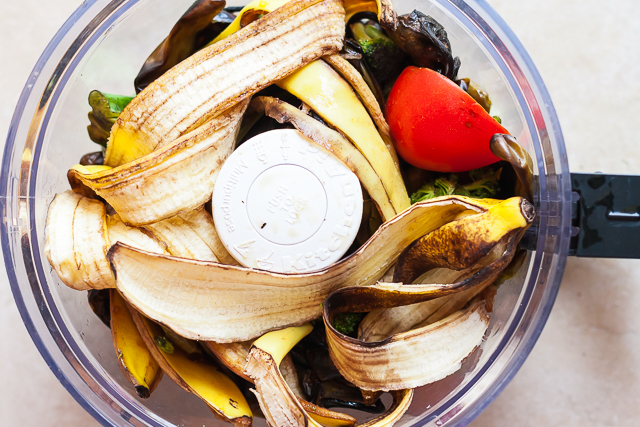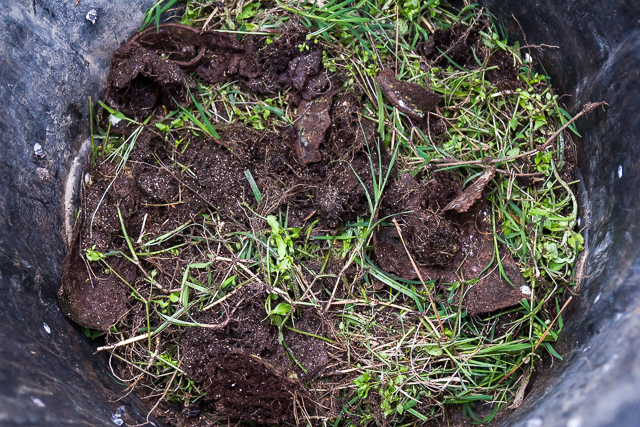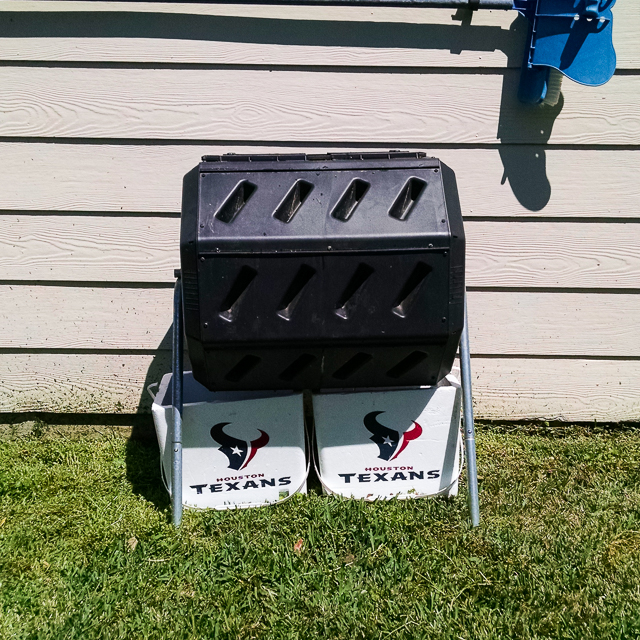
Let’s talk about decaying organic material. Yum, right?
Whether you’re just now thinking about how to prep last year’s beds for the new season or you’re thinking about fertilizing your existing garden, you’re really thinking about composting.
As your garden grows, the plants take nutrients from the soil and you’ll get a little settling/dirt compaction. You’ll want to replace those nutrients and bring the soil levels up by adding additional compost.
What is compost? Decaying plant materials. Where do you get it? Your kitchen and your back yard. (Or the home improvement store.)
First a little history.

I started with a homebrew composter – I took a large plastic garbage can, drilled holes all around it, and bungee-corded the lid on. When the yard was mowed, I dumped the bagged clippings in the bin. As I weeded the garden or pulled half-eaten tomatoes off the vine (&^%$#@! squirrels), I put them in the bin. If I transplanted a small potted plant to the garden, I added any leftover potting soil to the bin.

The holes allowed for aeration – I would turn the crazy-heavy bin on it’s side and roll it around to mix things up. And because we were in the middle of a drought, I had to remember to add water since yard clippings didn’t add enough moisture. To get the compost out, I essentially had to dump the entire thing to get to the “good stuff” at the bottom. It was a total PITA to deal with.

So last year, I upgraded to this rotating composter for my birthday. (25-years-old-Shawnda would straight pass-out on the floor if she knew that she’d be asking for a glorified trash can for her birthday just 10 years in the future.)
How I Compost
Getting started: Since my bin has two sides, a “cooking” side and a “feed me” side, I started by filling just one side of the bin completely cram-packed full. Since we mow our own lawn, I just emptied the mower bag into the bin – it didn’t take but a few weekends to get the first side full enough so that it didn’t settle very much. Then I simply moved to the other side.
Compostables: Lawn clippings, obviously. Kitchen scraps – but only uncooked vegetable scraps. Nothing that has been coated with oils or cooked, no animal products, no meat leftovers, no cheese, no breads – just raw plant scraps. We’re talking banana peels, apple cores, stem-end of jalapenos, tomato cast-offs, carrot peelings, a bag of shredded coleslaw that you bought and then forgot about, etc. Oh, and plenty of juiced citrus halves 🙂 I keep a gallon zipper bag on my kitchen counter and collect scraps and then regularly take the bag to the bin, empty it, rinse it out, and start all over again. If the compost bin is looking a little on the dry side, I’ll empty the bag into the food processor with some water and make a (sorry) Compost Smoothie. (Sorry again) Slurry. No, let’s stick with smoothie.
Maintenance: Give the tumbler a whirl 1-2x a week. You also want the compost to stay relatively (sorry) moist – dry, dusty compost does no one any good. During the peak of the Texas summer, just regularly adding “wet” compostables usually isn’t enough. I also usually wet the compost a with the garden hose ~once a month, which leads us to…

Compost Tea: When it’s garden-hose time, I put two Styrofoam coolers (GO TEXANS!!) under the bin to catch the run-off. Because what comes out is pure liquid fertilizer. I usually spray in enough water to get ~2 gallons of tea. Then I cut the tea with an equal part of water, pour it into the watering can, and water the garden with it. World’s happiest tomato plants, I tell you.
Using the compost: I slide the door halfway open, rotate the bin door-side-down, and use a small garden spade and a spare garden pot to catch the compost. Then I take it to the garden and spread it out.
And the next time I mow the lawn, I simply start all over again with the empty side.
Alright, now. Who else is far more excited than they should be about dirt?





